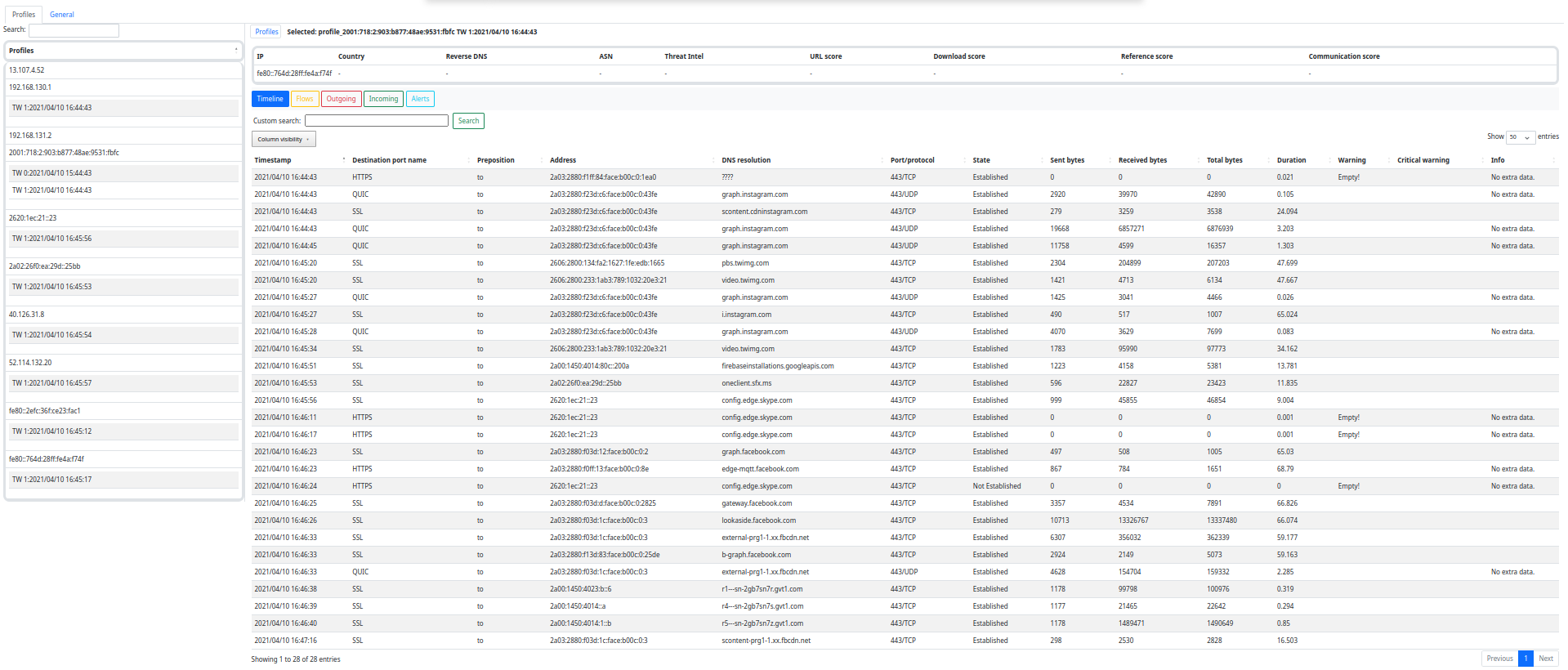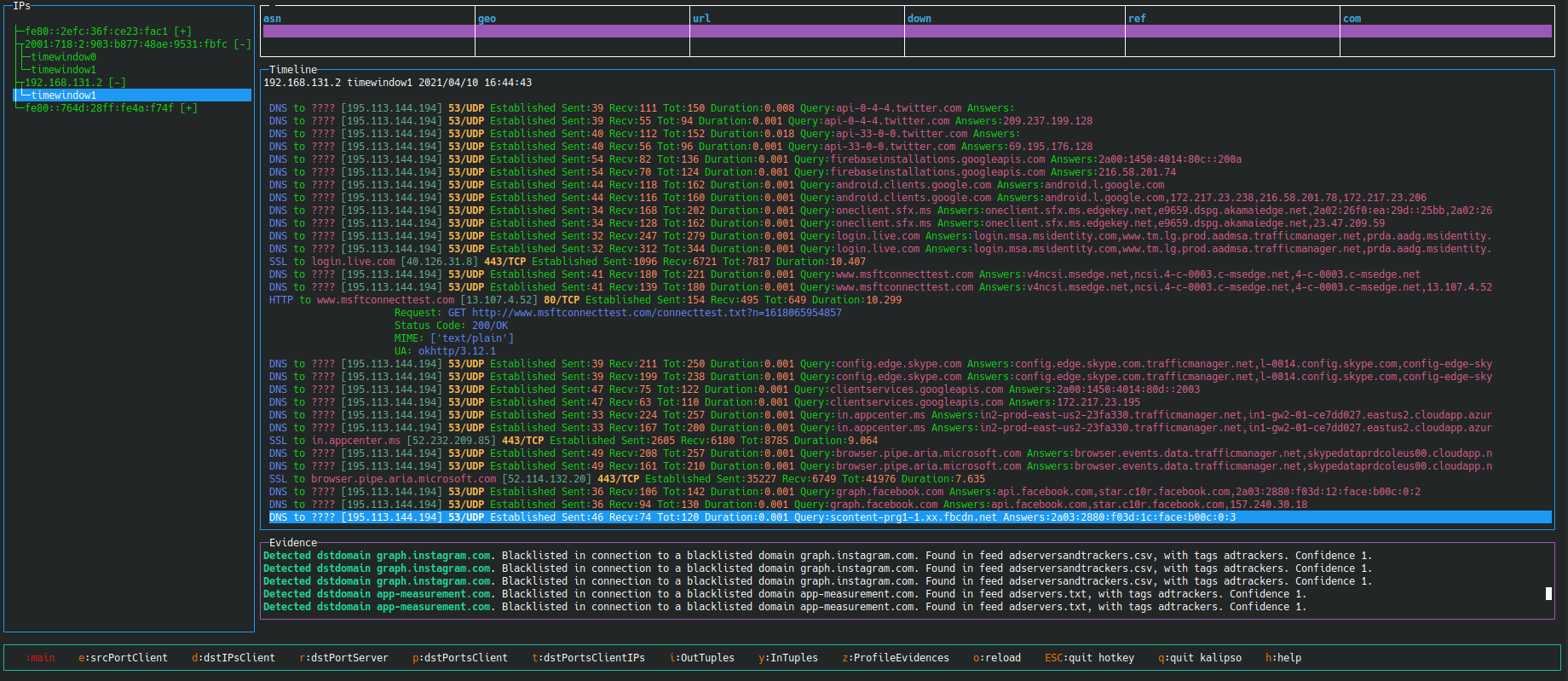
StratosphereLinuxIPS
Slips, a free software behavioral Python intrusion prevention system (IDS/IPS) that uses machine learning to detect malicious behaviors in the network traffic. Stratosphere Laboratory, AIC, FEL, CVUT in Prague.
Stars: 691
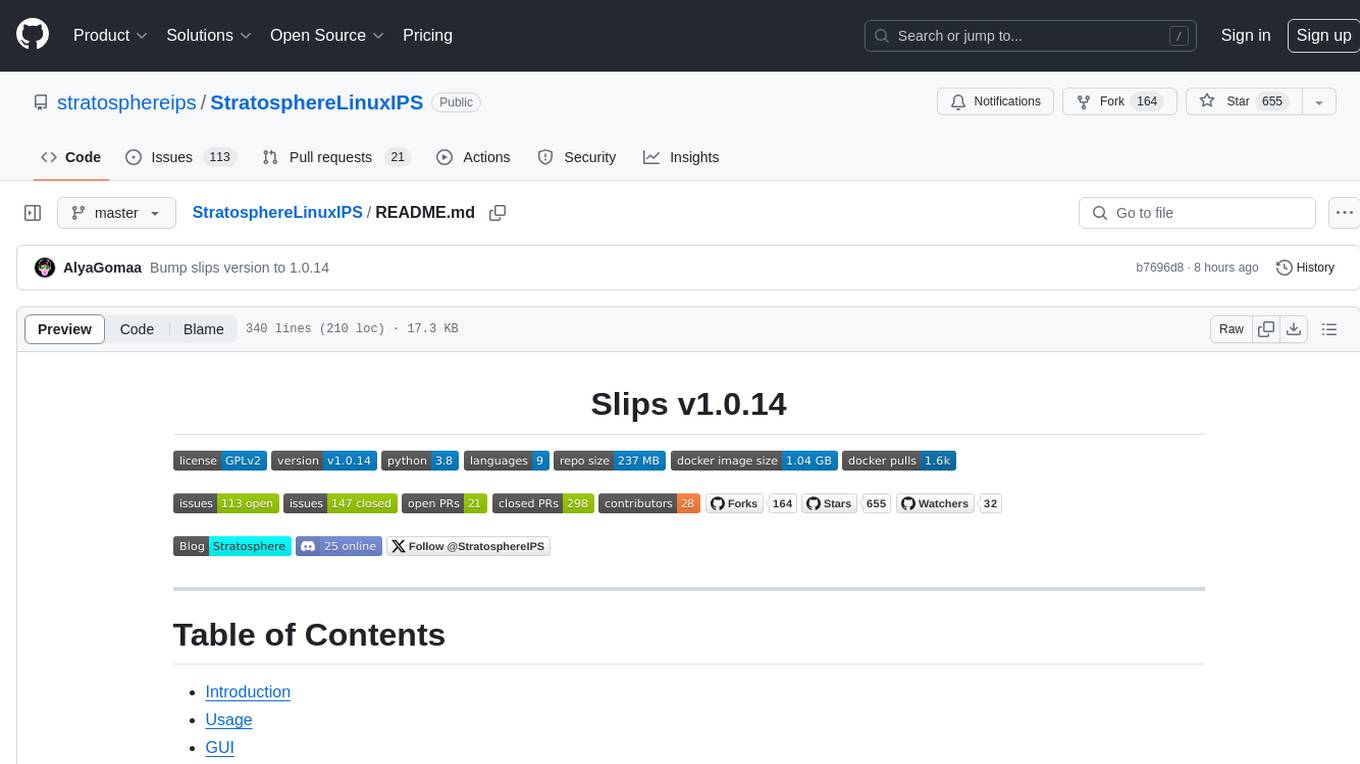
Slips is a powerful endpoint behavioral intrusion prevention and detection system that uses machine learning to detect malicious behaviors in network traffic. It can work with network traffic in real-time, PCAP files, and network flows from tools like Suricata, Zeek/Bro, and Argus. Slips threat detection is based on machine learning models, threat intelligence feeds, and expert heuristics. It gathers evidence of malicious behavior and triggers alerts when enough evidence is accumulated. The tool is Python-based and supported on Linux and MacOS, with blocking features only on Linux. Slips relies on Zeek network analysis framework and Redis for interprocess communication. It offers a graphical user interface for easy monitoring and analysis.
README:
- Introduction
- Usage
- GUI
- Requirements
- Installation
- Extended Usage
- Configuration
- Features
- Contributing
- Documentation
- Troubleshooting
- License
- Credits
- Changelog
- Roadmap
- Demos
- Funding
Slips is a powerful endpoint behavioral intrusion prevention and detection system that uses machine learning to detect malicious behaviors in network traffic. Slips can work with network traffic in real-time, PCAP files, and network flows from popular tools like Suricata, Zeek/Bro, and Argus. Slips threat detection is based on a combination of machine learning models trained to detect malicious behaviors, 40+ threat intelligence feeds, and expert heuristics. Slips gathers evidence of malicious behavior and uses extensively trained thresholds to trigger alerts when enough evidence is accumulated.
Slips is the first free software behavioral machine learning-based IDS/IPS for endpoints. It was created in 2012 by Sebastian Garcia at the Stratosphere Laboratory, AIC, FEE, Czech Technical University in Prague. The goal was to offer a local IDS/IPS that leverages machine learning to detect network attacks using behavioral analysis.
Slips is supported on Linux and MacOS only. The blocking features of Slips are only supported on Linux
Slips is Python-based and relies on Zeek network analysis framework for capturing live traffic and analyzing PCAPs. and relies on Redis >= 7.0.4 for interprocess communication.
The recommended way to use Slips is on Docker.
docker run --rm -it -p 55000:55000 --cpu-shares "700" --memory="8g" --memory-swap="8g" --net=host --cap-add=NET_ADMIN --name slips stratosphereips/slips:latest
./slips.py -f dataset/test7-malicious.pcap -o output_dir
cat output_dir/alerts.log
In macos do not use --net=host if you want to access the internal container's ports from the host.
docker run --rm -it -p 55000:55000 --cpu-shares "700" --memory="8g" --memory-swap="8g" --cap-add=NET_ADMIN --name slips stratosphereips/slips_macos_m1:latest
./slips.py -f dataset/test7-malicious.pcap -o output_dir
cat output_dir/alerts.log
docker run --rm -it -p 55000:55000 --cpu-shares "700" --memory="8g" --memory-swap="8g" --net=host --cap-add=NET_ADMIN --name slips stratosphereips/slips:latest
./slips.py -f dataset/test7-malicious.pcap -o output_dir
cat output_dir/alerts.log
For a detailed explanation of Slips parameters
To check Slips output using a GUI you can use the web interface or our command-line based interface Kalipso
./webinterface.sh
Then navigate to http://localhost:55000/ from your browser.
For more info about the web interface, check the docs: https://stratospherelinuxips.readthedocs.io/en/develop/usage.html#the-web-interface
./kalipso.sh
For more info about the Kalipso interface, check the docs: https://stratospherelinuxips.readthedocs.io/en/develop/usage.html#kalipso
Slips requires Python 3.10.12 and at least 4 GBs of RAM to run smoothly.
Slips can be run on different platforms, the easiest and most recommended way if you're a Linux user is to run Slips on Docker.
-
Docker
- Dockerhub (recommended)
- Docker-compose
- Dockerfile
- Native
- on RPI (Beta)
Slips has a config/slips.yaml that contains user configurations for different modules and general execution.
-
You can change the timewindow width by modifying the
time_window_widthparameter -
You can change the analysis direction to
allif you want to see the attacks from and to your computer -
You can also specify whether to
trainortestthe ML models -
You can enable popup notifications of evidence, enable blocking, plug in your own zeek script and more.
More details about the config file options here
Slips key features are:
- Behavioral Intrusion Prevention: Slips acts as a powerful system to prevent intrusions based on detecting malicious behaviors in network traffic using machine learning.
- Modularity: Slips is written in Python and is highly modular with different modules performing specific detections in the network traffic.
- Targeted Attacks and Command & Control Detection: It places a strong emphasis on identifying targeted attacks and command and control channels in network traffic.
- Traffic Analysis Flexibility: Slips can analyze network traffic in real-time, PCAP files, and network flows from popular tools like Suricata, Zeek/Bro, and Argus.
- Threat Intelligence Updates: Slips continuously updates threat intelligence files and databases, providing relevant detections as updates occur.
- Integration with External Platforms: Modules in Slips can look up IP addresses on external platforms such as VirusTotal and RiskIQ.
- Graphical User Interface: Slips provides a console graphical user interface (Kalipso) and a web interface for displaying detection with graphs and tables.
- Peer-to-Peer (P2P) Module: Slips includes a complex automatic system to find other peers in the network and share IoC data automatically in a balanced, trusted manner. The P2P module can be enabled as needed.
- Docker Implementation: Running Slips through Docker on Linux systems is simplified, allowing real-time traffic analysis.
- Detailed Documentation: Slips provides detailed documentation guiding users through usage instructions for efficient utilization of its features.
We welcome contributions to improve the functionality and features of Slips.
Please read carefully the contributing guidelines for contributing to the development of Slips
You can run Slips and report bugs, make feature requests, and suggest ideas, open a pull request with a solved GitHub issue and new feature, or open a pull request with a new detection module.
The instructions to create a new detection module along with a template here.
If you are a student, we encourage you to apply for the Google Summer of Code program that we participate in as a hosting organization.
Check Slips in GSoC2023 for more information.
You can join our conversations in Discord for questions and discussions. We appreciate your contributions and thank you for helping to improve Slips!
If you can't listen to an interface without sudo, you can run the following command to let any user use Zeek to listen to an interface not just root.
sudo setcap cap_net_raw,cap_net_admin=eip /<path-to-zeek-bin/zeek
You can join our conversations in Discord for questions and discussions.
Or email us at
Founder: Sebastian Garcia, [email protected], [email protected].
Main authors: Sebastian Garcia, Alya Gomaa, Kamila Babayeva
Contributors:
- Veronica Valeros
- Frantisek Strasak
- Dita Hollmannova
- Ondrej Lukas
- Elaheh Biglar Beigi
- Martin Řepa
- arkamar
- Maria Rigaki
- Lukas Forst
- Daniel Yang
https://github.com/stratosphereips/StratosphereLinuxIPS/blob/develop/CHANGELOG.md
The following videos contain demos of Slips in action in various events:
- 2022 BlackHat Europe Arsenal, Slips: A Machine-Learning Based, Free-Software, Network Intrusion Prevention System [web]
- 2022 BlackHat USA Arsenal, Slips: A Machine-Learning Based, Free-Software, Network Intrusion Prevention System [web]
- 2021 BlackHat Europe Arsenal, Slips: A Machine-Learning Based, Free-Software, Network Intrusion Prevention System [slides] [web]
- 2021 BlackHat USA Arsenal, Slips: A Machine-Learning Based, Free-Software, Network Intrusion Prevention System [web]
- 2021 BlackHat Asia Arsenal, Slips: A Machine-Learning Based, Free-Software, Network Intrusion Prevention System [web]
- 2020 Hack In The Box CyberWeek, Android RATs Detection With A Machine Learning-Based Python IDS [video]
- 2019 OpenAlt, Fantastic Attacks and How Kalipso can Find Them [video]
- 2016 Ekoparty, Stratosphere IPS. The free machine learning malware detection [video]
We are grateful for the generous support and funding provided by the following organizations:
- NlNet Foundation, https://nlnet.nl/
This project is funded through NGI0 Entrust, a fund established by NLnet with financial support from the European Commission's Next Generation Internet program. Learn more at the NLnet project page.
- Artificial Intelligence Centre at the Czech Technical University in Prague, https://www.aic.fel.cvut.cz/
- Avast, https://www.avast.com/
- CESNET, https://www.cesnet.cz/
- Google Summer of Code (2023, 2024), https://summerofcode.withgoogle.com/
Their funding has played a crucial role in the development and success of this project. We sincerely appreciate their commitment to advancing technology and their recognition of the value Slips brings to the community.
For Tasks:
Click tags to check more tools for each tasksFor Jobs:
Alternative AI tools for StratosphereLinuxIPS
Similar Open Source Tools

StratosphereLinuxIPS
Slips is a powerful endpoint behavioral intrusion prevention and detection system that uses machine learning to detect malicious behaviors in network traffic. It can work with network traffic in real-time, PCAP files, and network flows from tools like Suricata, Zeek/Bro, and Argus. Slips threat detection is based on machine learning models, threat intelligence feeds, and expert heuristics. It gathers evidence of malicious behavior and triggers alerts when enough evidence is accumulated. The tool is Python-based and supported on Linux and MacOS, with blocking features only on Linux. Slips relies on Zeek network analysis framework and Redis for interprocess communication. It offers a graphical user interface for easy monitoring and analysis.
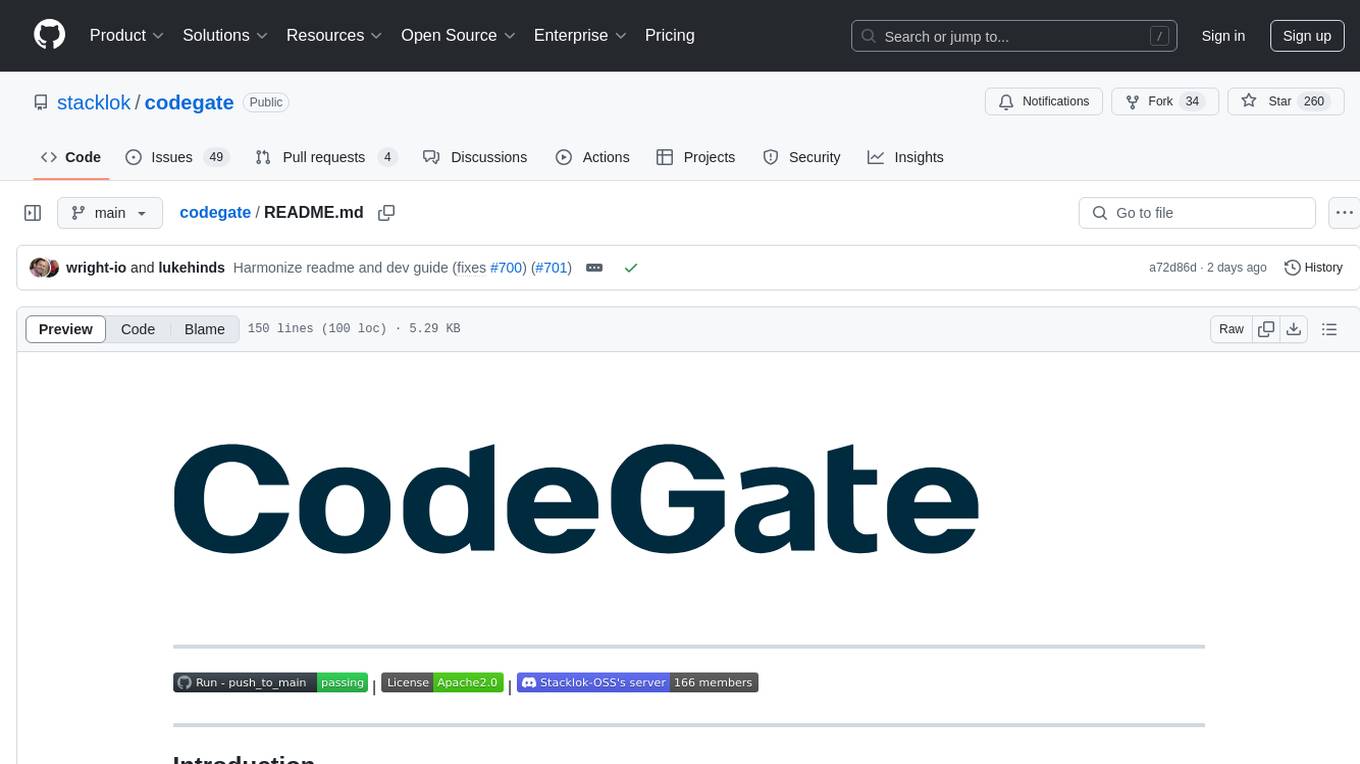
codegate
CodeGate is a local gateway that enhances the safety of AI coding assistants by ensuring AI-generated recommendations adhere to best practices, safeguarding code integrity, and protecting individual privacy. Developed by Stacklok, CodeGate allows users to confidently leverage AI in their development workflow without compromising security or productivity. It works seamlessly with coding assistants, providing real-time security analysis of AI suggestions. CodeGate is designed with privacy at its core, keeping all data on the user's machine and offering complete control over data.

UltraRAG
The UltraRAG framework is a researcher and developer-friendly RAG system solution that simplifies the process from data construction to model fine-tuning in domain adaptation. It introduces an automated knowledge adaptation technology system, supporting no-code programming, one-click synthesis and fine-tuning, multidimensional evaluation, and research-friendly exploration work integration. The architecture consists of Frontend, Service, and Backend components, offering flexibility in customization and optimization. Performance evaluation in the legal field shows improved results compared to VanillaRAG, with specific metrics provided. The repository is licensed under Apache-2.0 and encourages citation for support.
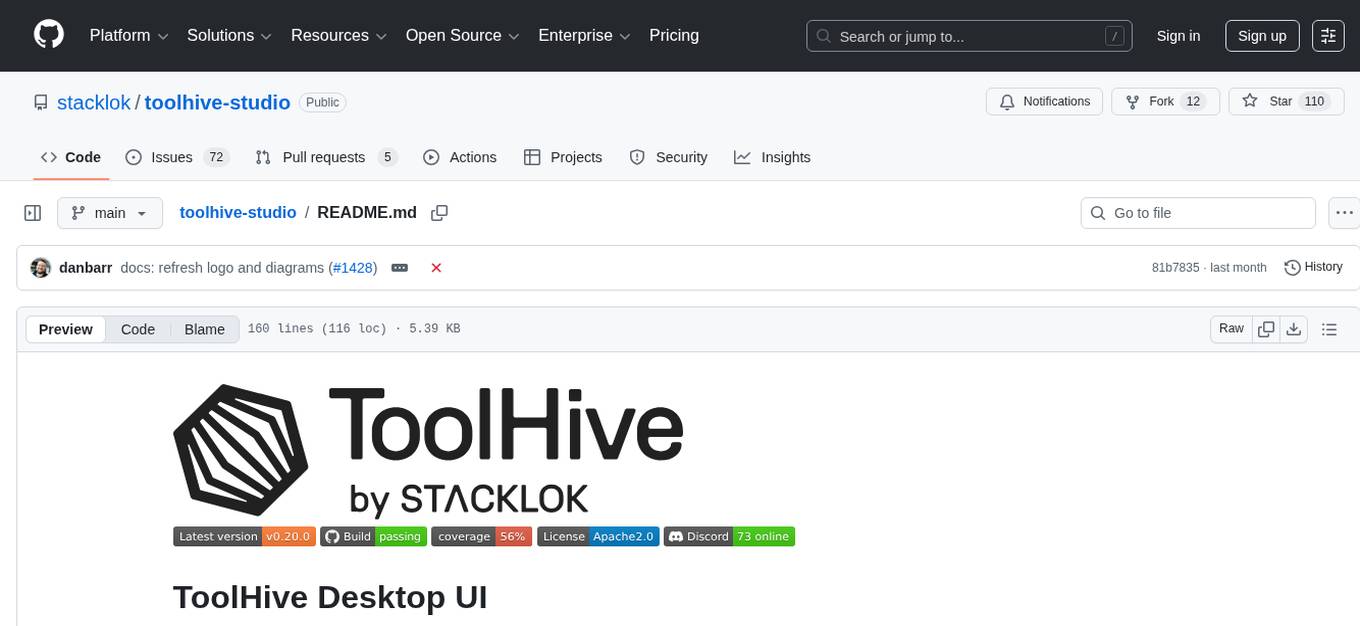
toolhive-studio
ToolHive Studio is an experimental project under active development and testing, providing an easy way to discover, deploy, and manage Model Context Protocol (MCP) servers securely. Users can launch any MCP server in a locked-down container with just a few clicks, eliminating manual setup, security concerns, and runtime issues. The tool ensures instant deployment, default security measures, cross-platform compatibility, and seamless integration with popular clients like GitHub Copilot, Cursor, and Claude Code.

gptme
Personal AI assistant/agent in your terminal, with tools for using the terminal, running code, editing files, browsing the web, using vision, and more. A great coding agent that is general-purpose to assist in all kinds of knowledge work, from a simple but powerful CLI. An unconstrained local alternative to ChatGPT with 'Code Interpreter', Cursor Agent, etc. Not limited by lack of software, internet access, timeouts, or privacy concerns if using local models.

gptme
GPTMe is a tool that allows users to interact with an LLM assistant directly in their terminal in a chat-style interface. The tool provides features for the assistant to run shell commands, execute code, read/write files, and more, making it suitable for various development and terminal-based tasks. It serves as a local alternative to ChatGPT's 'Code Interpreter,' offering flexibility and privacy when using a local model. GPTMe supports code execution, file manipulation, context passing, self-correction, and works with various AI models like GPT-4. It also includes a GitHub Bot for requesting changes and operates entirely in GitHub Actions. In progress features include handling long contexts intelligently, a web UI and API for conversations, web and desktop vision, and a tree-based conversation structure.
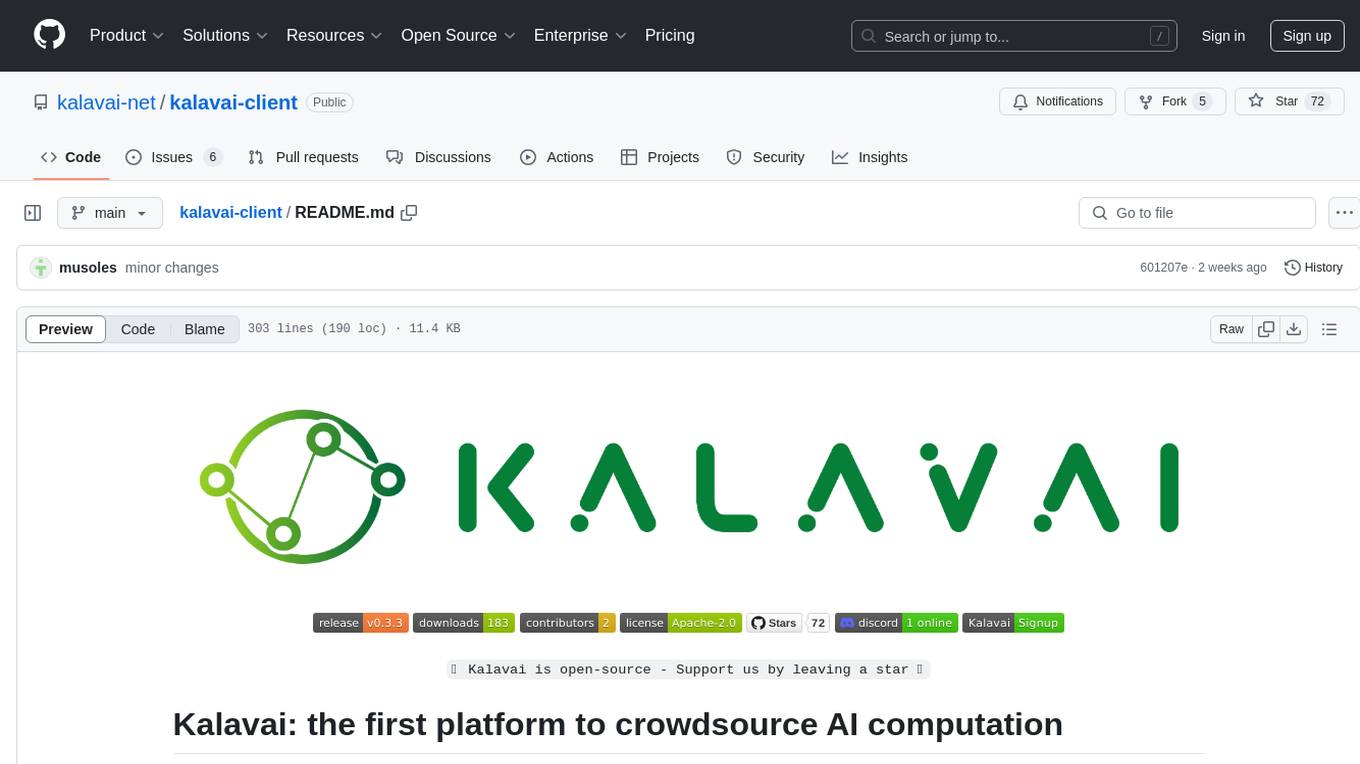
kalavai-client
Kalavai is an open-source platform that transforms everyday devices into an AI supercomputer by aggregating resources from multiple machines. It facilitates matchmaking of resources for large AI projects, making AI hardware accessible and affordable. Users can create local and public pools, connect with the community's resources, and share computing power. The platform aims to be a management layer for research groups and organizations, enabling users to unlock the power of existing hardware without needing a devops team. Kalavai CLI tool helps manage both versions of the platform.

TaskingAI
TaskingAI brings Firebase's simplicity to **AI-native app development**. The platform enables the creation of GPTs-like multi-tenant applications using a wide range of LLMs from various providers. It features distinct, modular functions such as Inference, Retrieval, Assistant, and Tool, seamlessly integrated to enhance the development process. TaskingAI’s cohesive design ensures an efficient, intelligent, and user-friendly experience in AI application development.
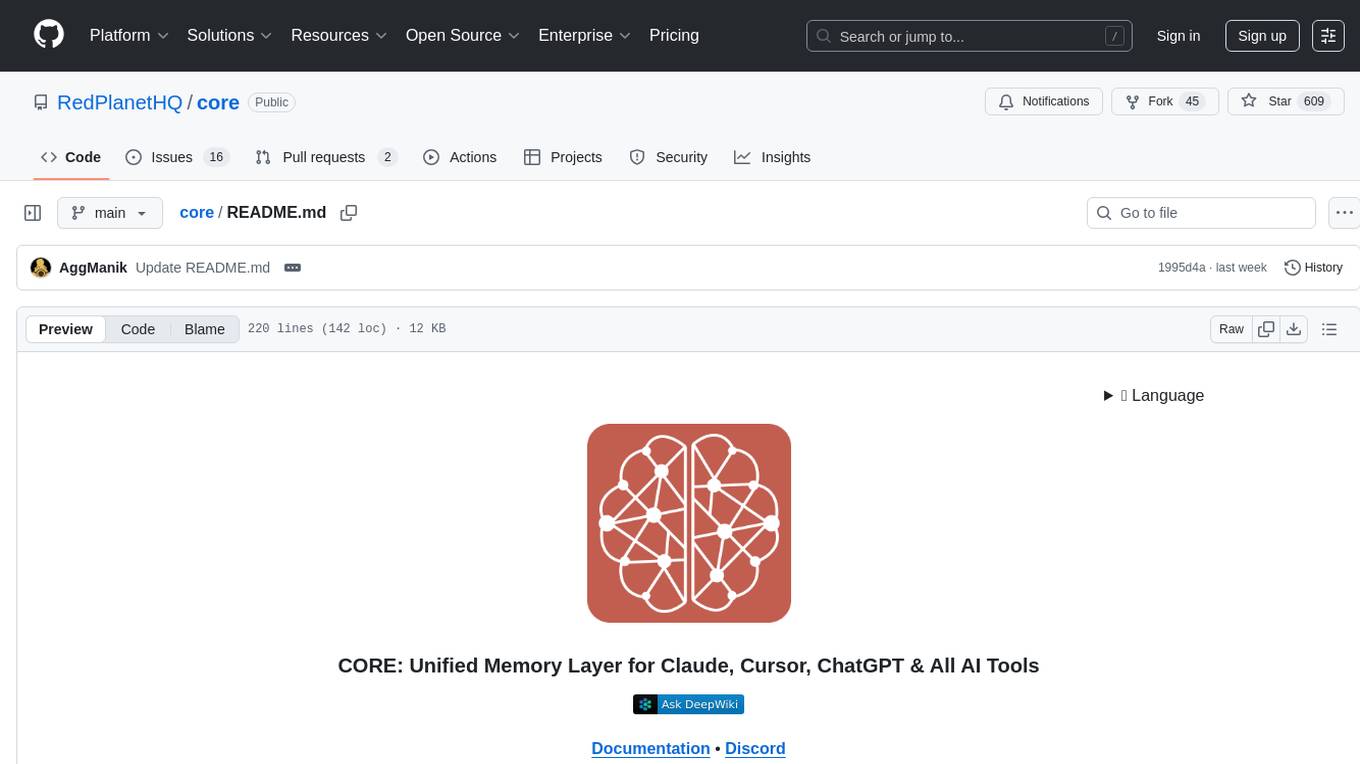
core
CORE is an open-source unified, persistent memory layer for all AI tools, allowing developers to maintain context across different tools like Cursor, ChatGPT, and Claude. It aims to solve the issue of context switching and information loss between sessions by creating a knowledge graph that remembers conversations, decisions, and insights. With features like unified memory, temporal knowledge graph, browser extension, chat with memory, auto-sync from apps, and MCP integration hub, CORE provides a seamless experience for managing and recalling context. The tool's ingestion pipeline captures evolving context through normalization, extraction, resolution, and graph integration, resulting in a dynamic memory that grows and changes with the user. When recalling from memory, CORE utilizes search, re-ranking, filtering, and output to provide relevant and contextual answers. Security measures include data encryption, authentication, access control, and vulnerability reporting.
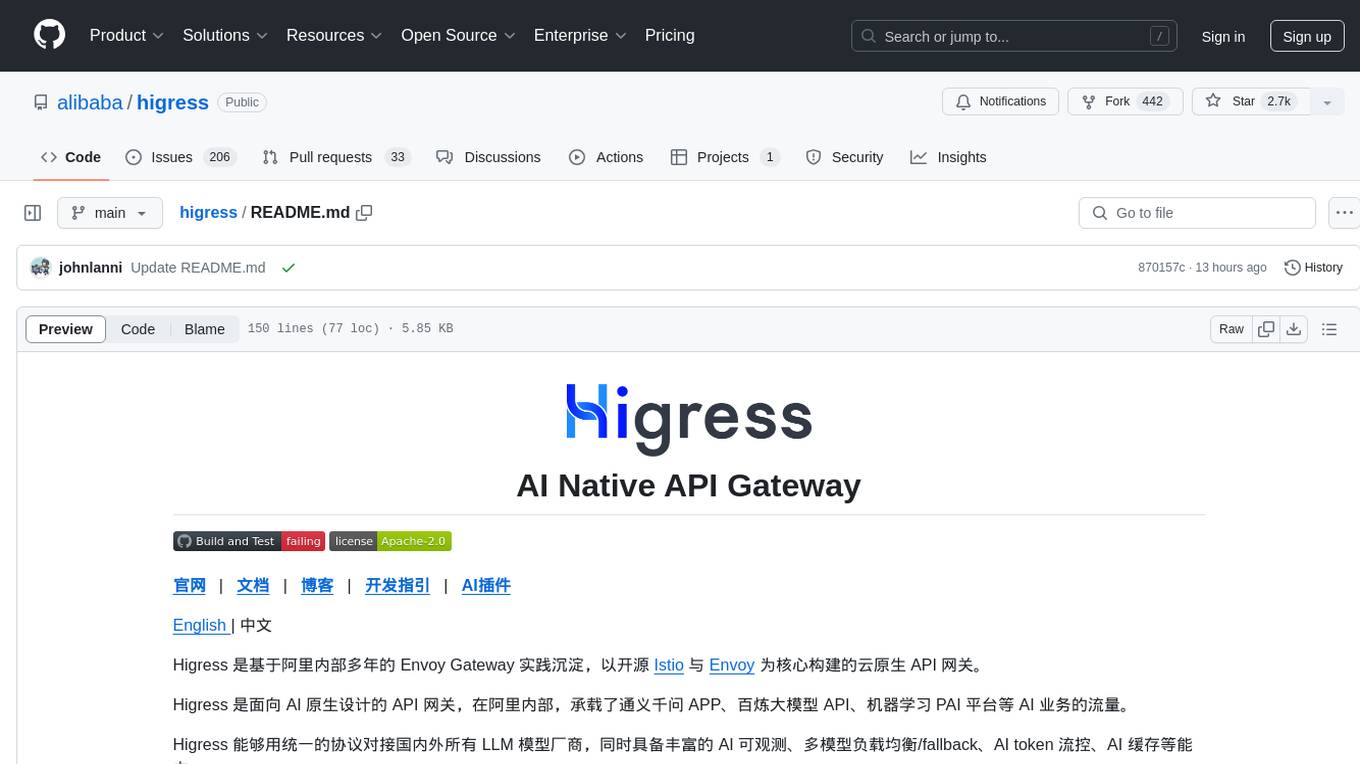
higress
Higress is an open-source cloud-native API gateway built on the core of Istio and Envoy, based on Alibaba's internal practice of Envoy Gateway. It is designed for AI-native API gateway, serving AI businesses such as Tongyi Qianwen APP, Bailian Big Model API, and Machine Learning PAI platform. Higress provides capabilities to interface with LLM model vendors, AI observability, multi-model load balancing/fallback, AI token flow control, and AI caching. It offers features for AI gateway, Kubernetes Ingress gateway, microservices gateway, and security protection gateway, with advantages in production-level scalability, stream processing, extensibility, and ease of use.
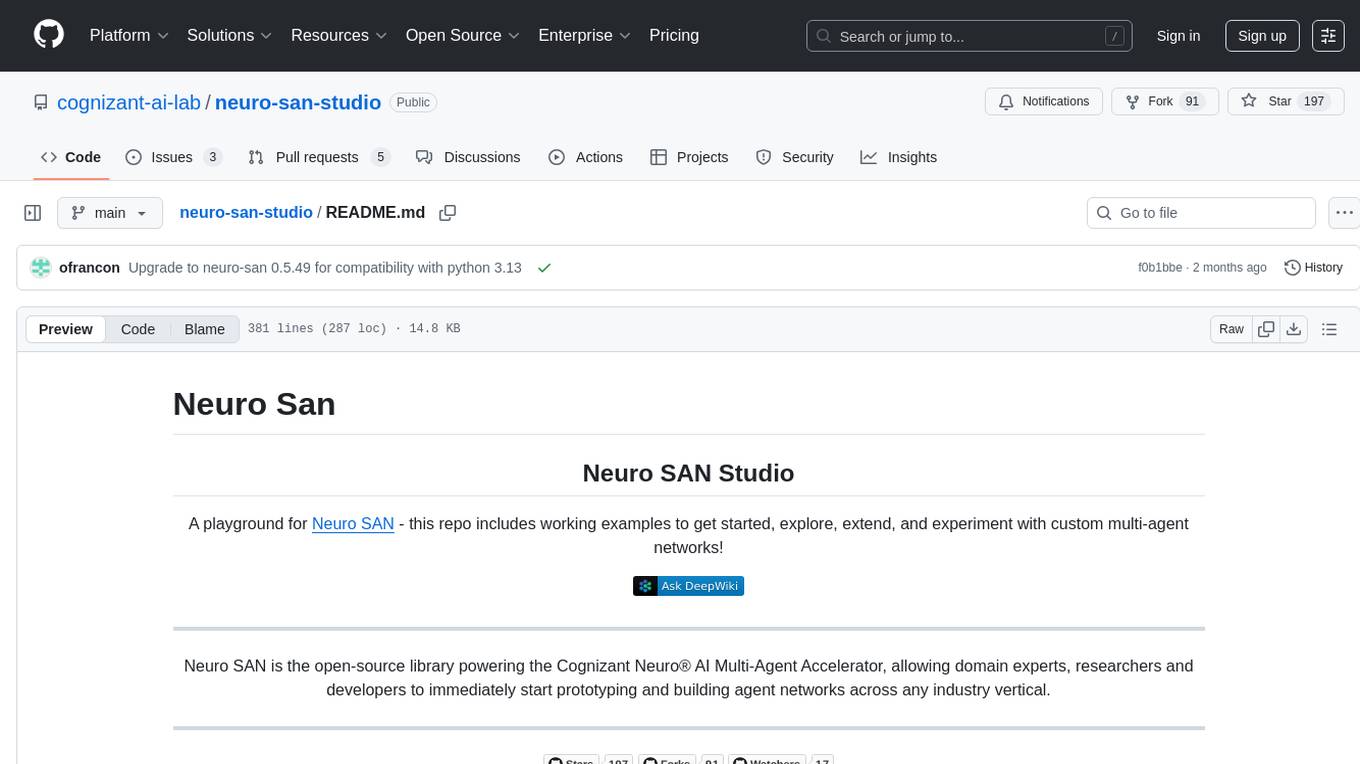
neuro-san-studio
Neuro SAN Studio is an open-source library for building agent networks across various industries. It simplifies the development of collaborative AI systems by enabling users to create sophisticated multi-agent applications using declarative configuration files. The tool offers features like data-driven configuration, adaptive communication protocols, safe data handling, dynamic agent network designer, flexible tool integration, robust traceability, and cloud-agnostic deployment. It has been used in various use-cases such as automated generation of multi-agent configurations, airline policy assistance, banking operations, market analysis in consumer packaged goods, insurance claims processing, intranet knowledge management, retail operations, telco network support, therapy vignette supervision, and more.

langmanus
LangManus is a community-driven AI automation framework that combines language models with specialized tools for tasks like web search, crawling, and Python code execution. It implements a hierarchical multi-agent system with agents like Coordinator, Planner, Supervisor, Researcher, Coder, Browser, and Reporter. The framework supports LLM integration, search and retrieval tools, Python integration, workflow management, and visualization. LangManus aims to give back to the open-source community and welcomes contributions in various forms.
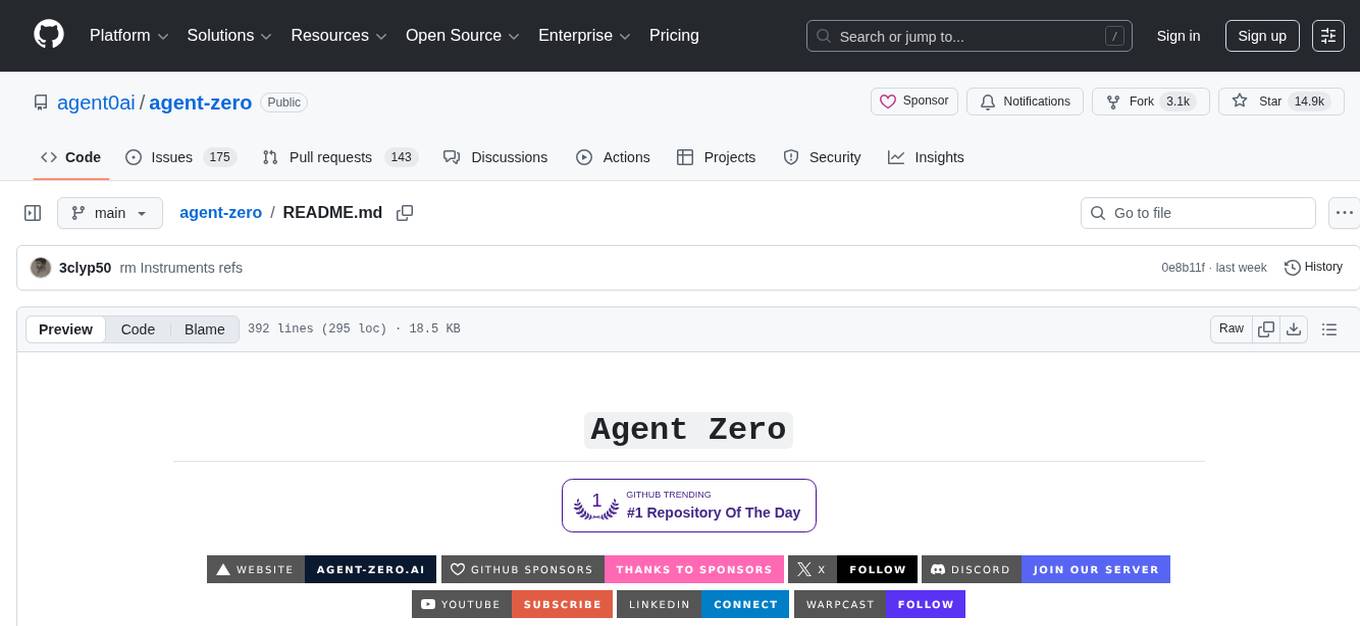
agent-zero
Agent Zero is a personal, organic agentic framework designed to be dynamic, transparent, customizable, and interactive. It uses the computer as a tool to accomplish tasks, with features like general-purpose assistant, computer as a tool, multi-agent cooperation, customizable and extensible framework, and communication skills. The tool is fully Dockerized, with Speech-to-Text and TTS capabilities, and offers real-world use cases like financial analysis, Excel automation, API integration, server monitoring, and project isolation. Agent Zero can be dangerous if not used properly and is prompt-based, guided by the prompts folder. The tool is extensively documented and has a changelog highlighting various updates and improvements.

DevoxxGenieIDEAPlugin
Devoxx Genie is a Java-based IntelliJ IDEA plugin that integrates with local and cloud-based LLM providers to aid in reviewing, testing, and explaining project code. It supports features like code highlighting, chat conversations, and adding files/code snippets to context. Users can modify REST endpoints and LLM parameters in settings, including support for cloud-based LLMs. The plugin requires IntelliJ version 2023.3.4 and JDK 17. Building and publishing the plugin is done using Gradle tasks. Users can select an LLM provider, choose code, and use commands like review, explain, or generate unit tests for code analysis.

BentoML
BentoML is an open-source model serving library for building performant and scalable AI applications with Python. It comes with everything you need for serving optimization, model packaging, and production deployment.

AIL-framework
AIL framework is a modular framework to analyze potential information leaks from unstructured data sources like pastes from Pastebin or similar services or unstructured data streams. AIL framework is flexible and can be extended to support other functionalities to mine or process sensitive information (e.g. data leak prevention).
For similar tasks
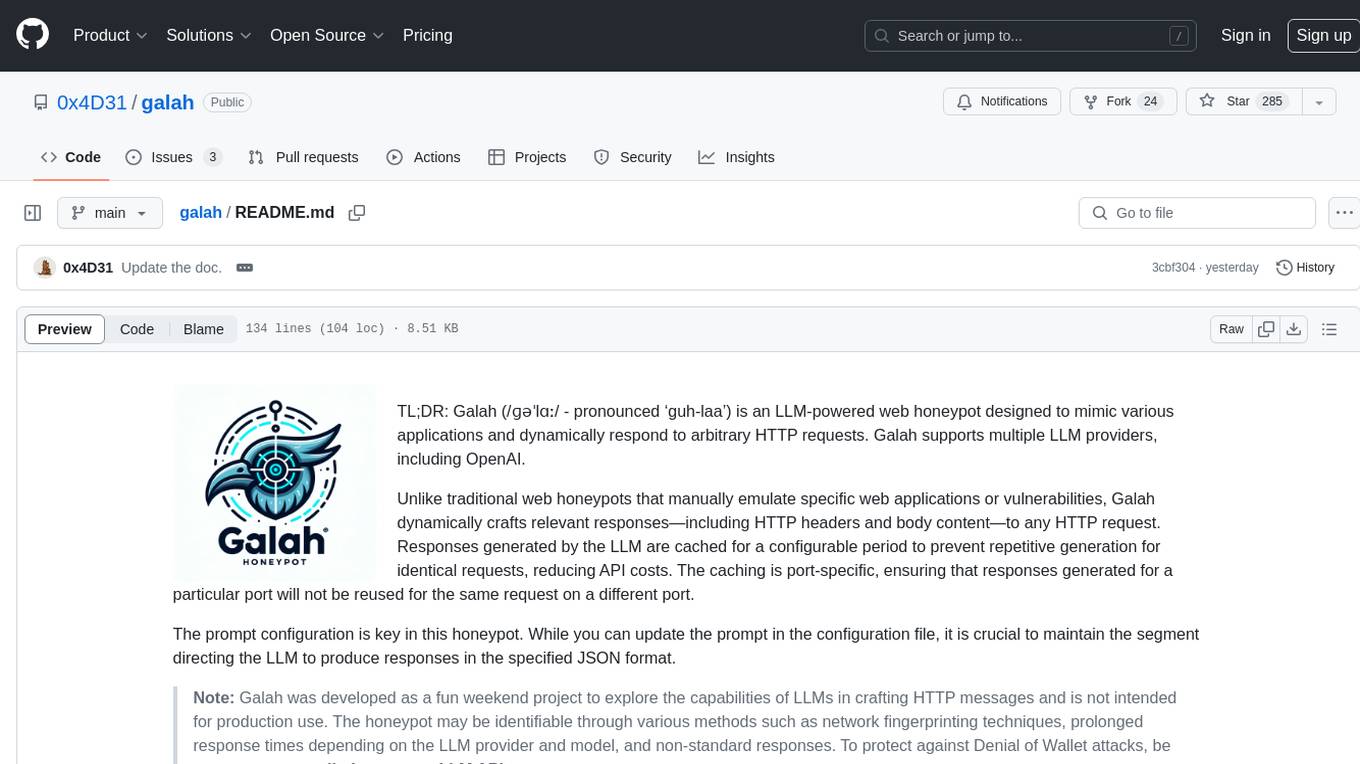
galah
Galah is an LLM-powered web honeypot designed to mimic various applications and dynamically respond to arbitrary HTTP requests. It supports multiple LLM providers, including OpenAI. Unlike traditional web honeypots, Galah dynamically crafts responses for any HTTP request, caching them to reduce repetitive generation and API costs. The honeypot's configuration is crucial, directing the LLM to produce responses in a specified JSON format. Note that Galah is a weekend project exploring LLM capabilities and not intended for production use, as it may be identifiable through network fingerprinting and non-standard responses.

StratosphereLinuxIPS
Slips is a powerful endpoint behavioral intrusion prevention and detection system that uses machine learning to detect malicious behaviors in network traffic. It can work with network traffic in real-time, PCAP files, and network flows from tools like Suricata, Zeek/Bro, and Argus. Slips threat detection is based on machine learning models, threat intelligence feeds, and expert heuristics. It gathers evidence of malicious behavior and triggers alerts when enough evidence is accumulated. The tool is Python-based and supported on Linux and MacOS, with blocking features only on Linux. Slips relies on Zeek network analysis framework and Redis for interprocess communication. It offers a graphical user interface for easy monitoring and analysis.
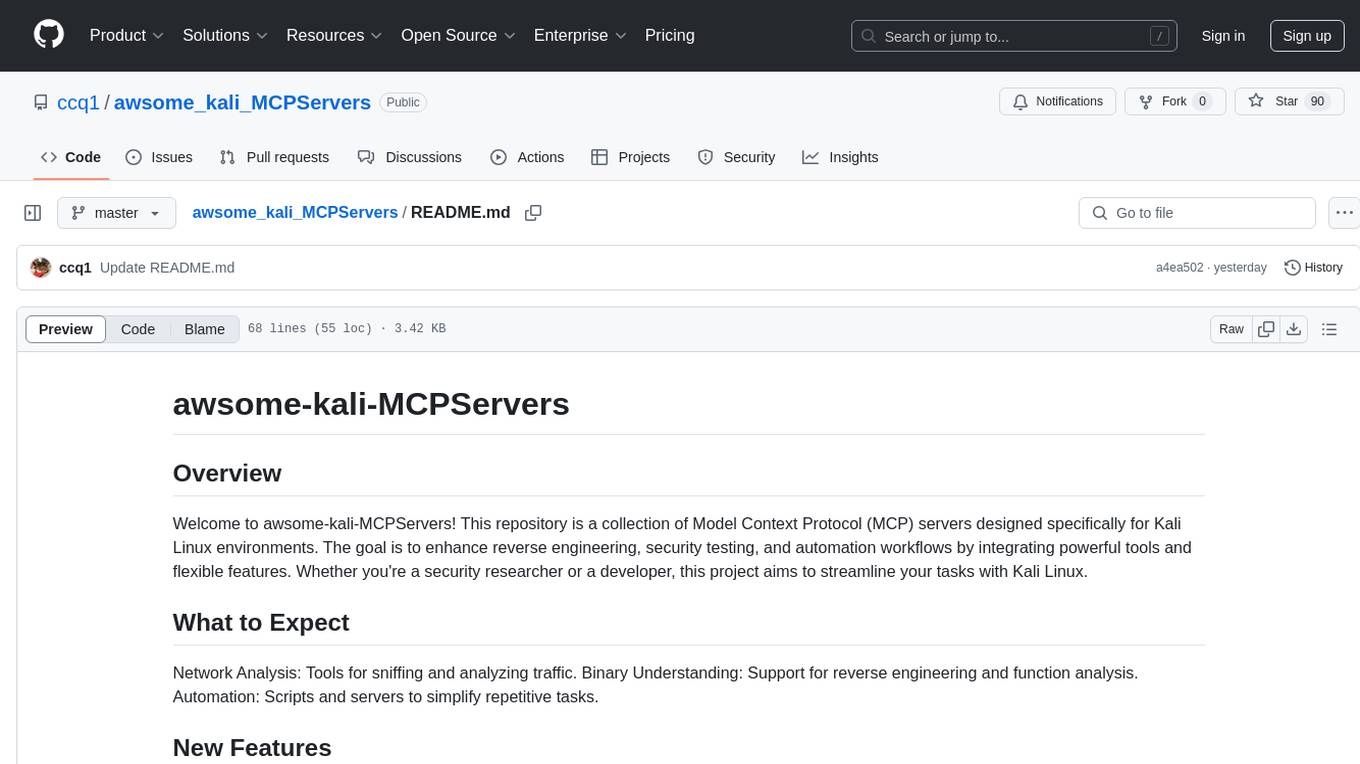
awsome_kali_MCPServers
awsome-kali-MCPServers is a repository containing Model Context Protocol (MCP) servers tailored for Kali Linux environments. It aims to optimize reverse engineering, security testing, and automation tasks by incorporating powerful tools and flexible features. The collection includes network analysis tools, support for binary understanding, and automation scripts to streamline repetitive tasks. The repository is continuously evolving with new features and integrations based on the FastMCP framework, such as network scanning, symbol analysis, binary analysis, string extraction, network traffic analysis, and sandbox support using Docker containers.
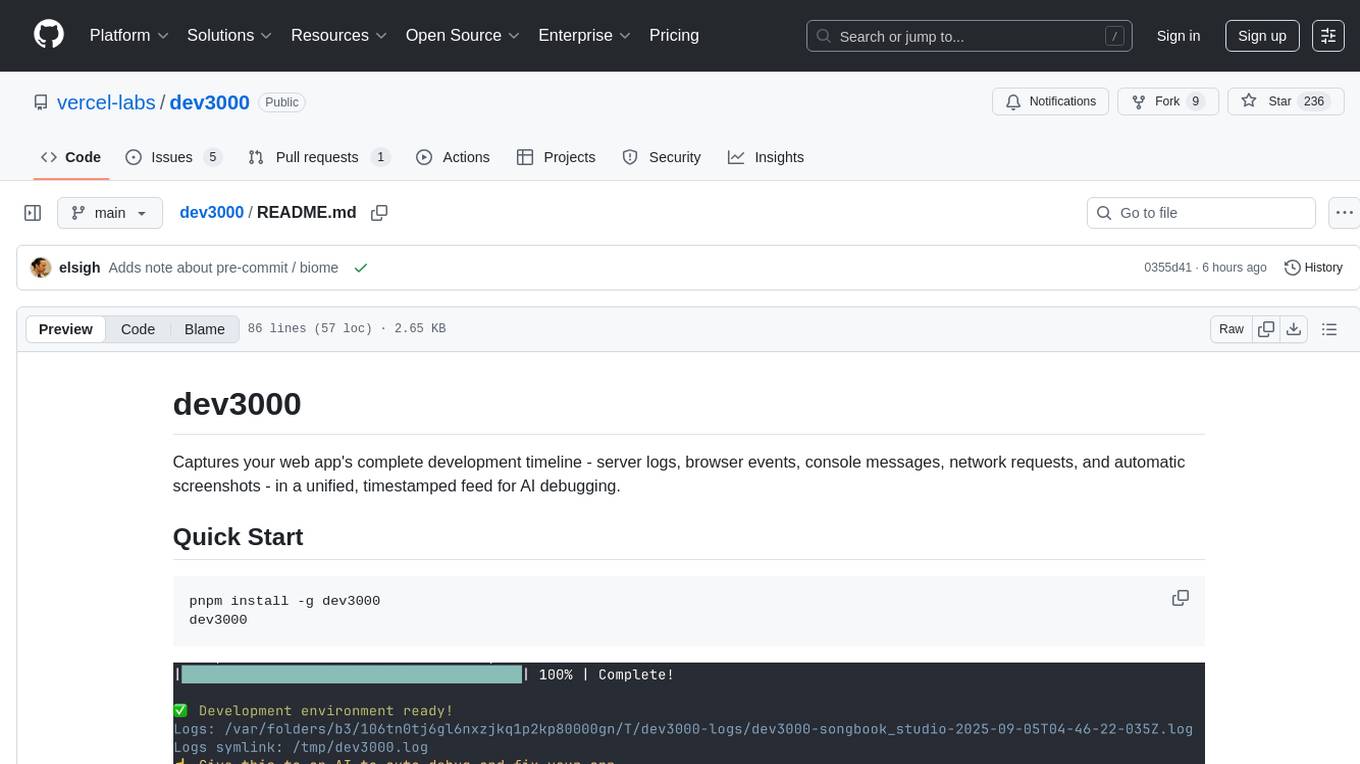
dev3000
dev3000 captures your web app's complete development timeline including server logs, browser events, console messages, network requests, and automatic screenshots in a unified, timestamped feed for AI debugging. It creates a comprehensive log of your development session that AI assistants can easily understand, monitoring your app in a real browser and capturing server logs, console output, browser console messages and errors, network requests and responses, and automatic screenshots on navigation, errors, and key events. Logs are saved with timestamps and rotated to keep the 10 most recent per project, with the current session symlinked for easy access. The tool integrates with AI assistants for instant debugging and provides advanced querying options through the MCP server.
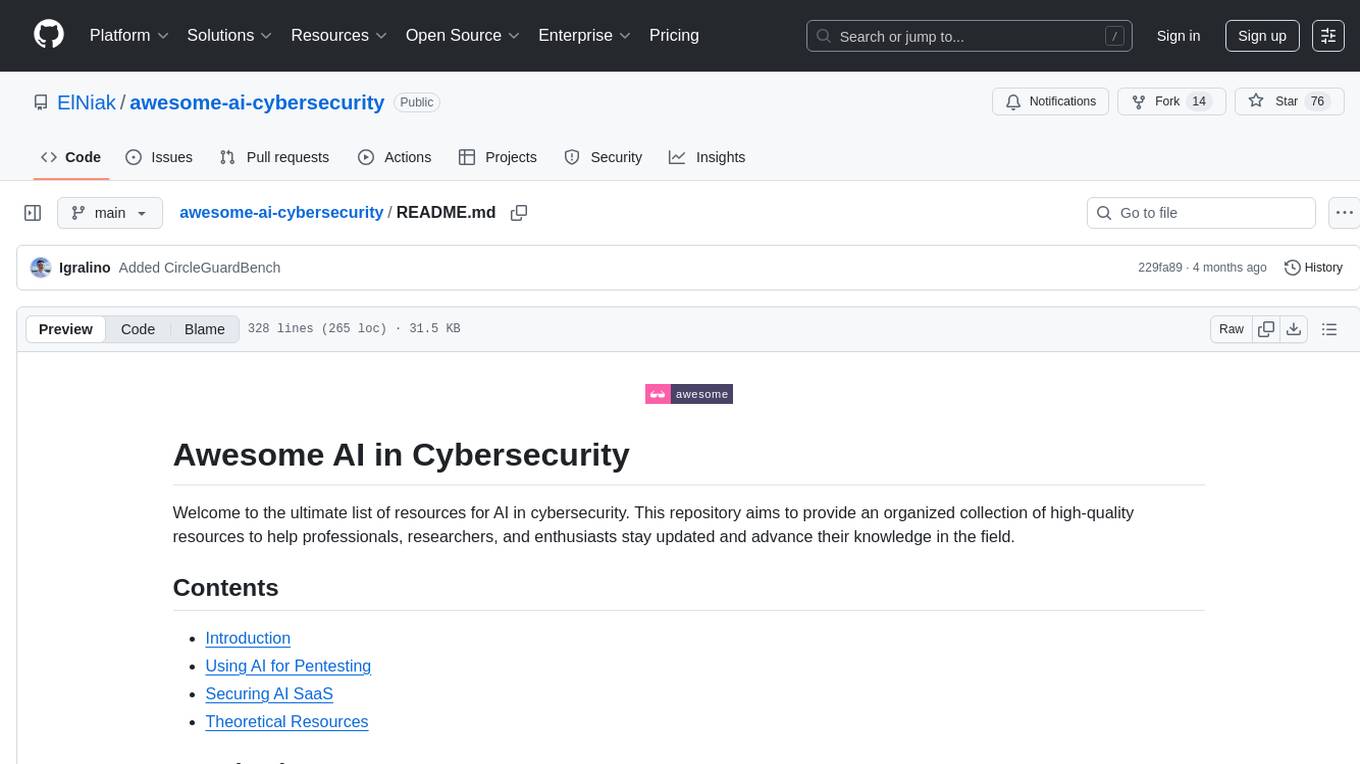
awesome-ai-cybersecurity
This repository is a comprehensive collection of resources for utilizing AI in cybersecurity. It covers various aspects such as prediction, prevention, detection, response, monitoring, and more. The resources include tools, frameworks, case studies, best practices, tutorials, and research papers. The repository aims to assist professionals, researchers, and enthusiasts in staying updated and advancing their knowledge in the field of AI cybersecurity.
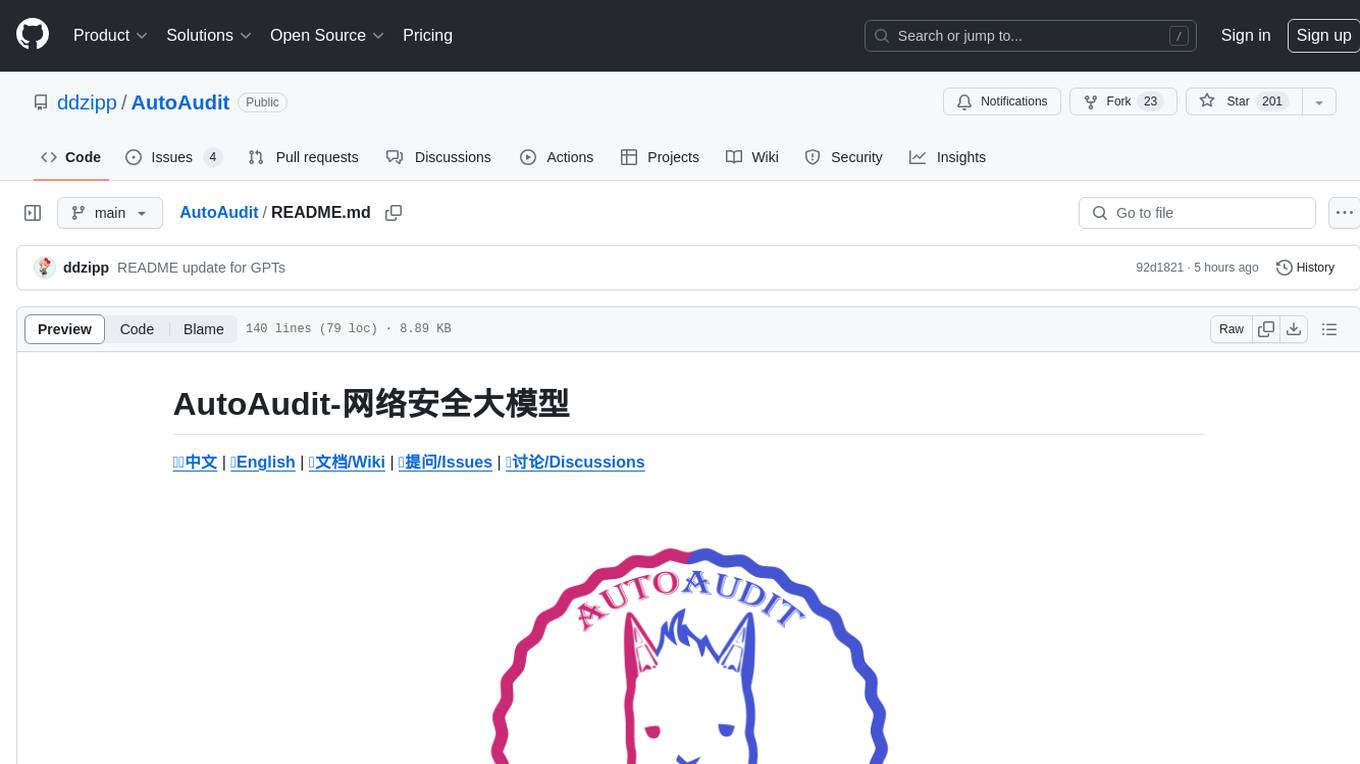
AutoAudit
AutoAudit is an open-source large language model specifically designed for the field of network security. It aims to provide powerful natural language processing capabilities for security auditing and network defense, including analyzing malicious code, detecting network attacks, and predicting security vulnerabilities. By coupling AutoAudit with ClamAV, a security scanning platform has been created for practical security audit applications. The tool is intended to assist security professionals with accurate and fast analysis and predictions to combat evolving network threats.
For similar jobs

ciso-assistant-community
CISO Assistant is a tool that helps organizations manage their cybersecurity posture and compliance. It provides a centralized platform for managing security controls, threats, and risks. CISO Assistant also includes a library of pre-built frameworks and tools to help organizations quickly and easily implement best practices.
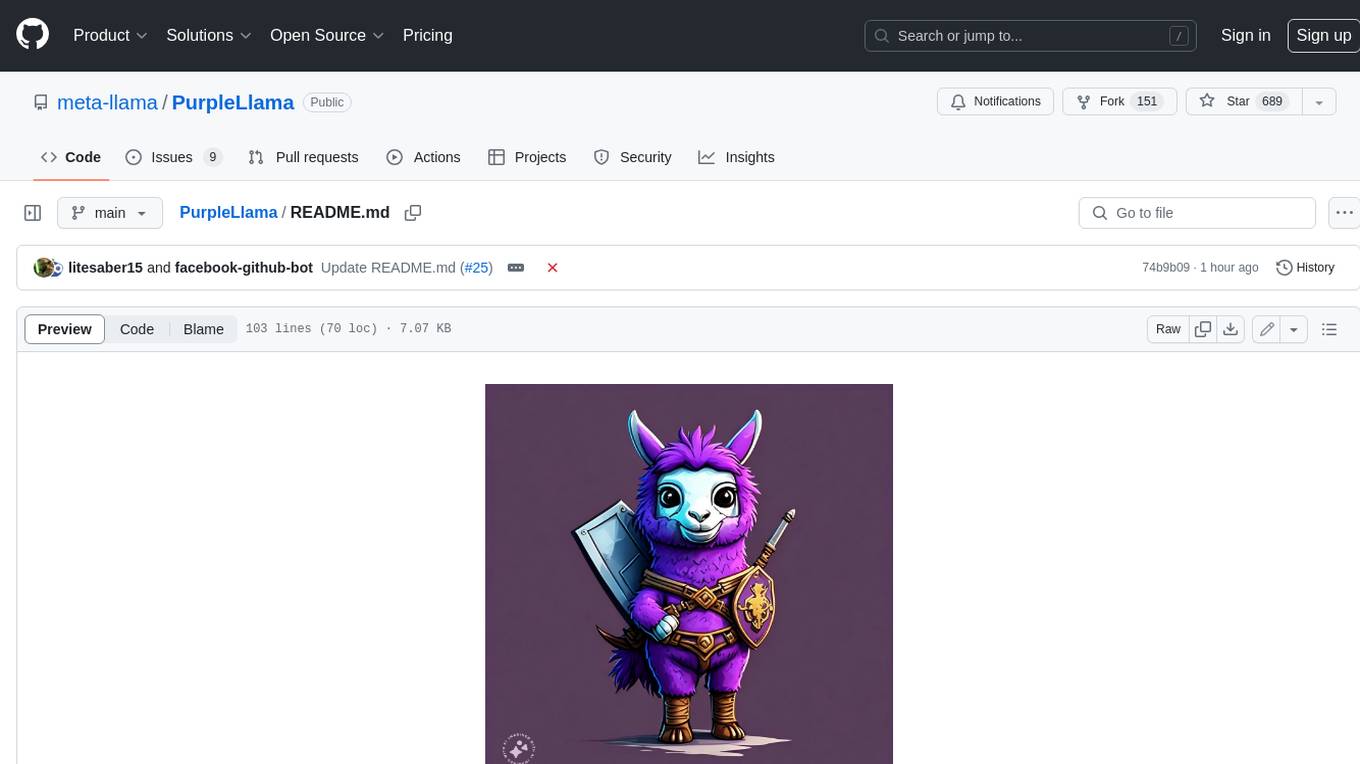
PurpleLlama
Purple Llama is an umbrella project that aims to provide tools and evaluations to support responsible development and usage of generative AI models. It encompasses components for cybersecurity and input/output safeguards, with plans to expand in the future. The project emphasizes a collaborative approach, borrowing the concept of purple teaming from cybersecurity, to address potential risks and challenges posed by generative AI. Components within Purple Llama are licensed permissively to foster community collaboration and standardize the development of trust and safety tools for generative AI.
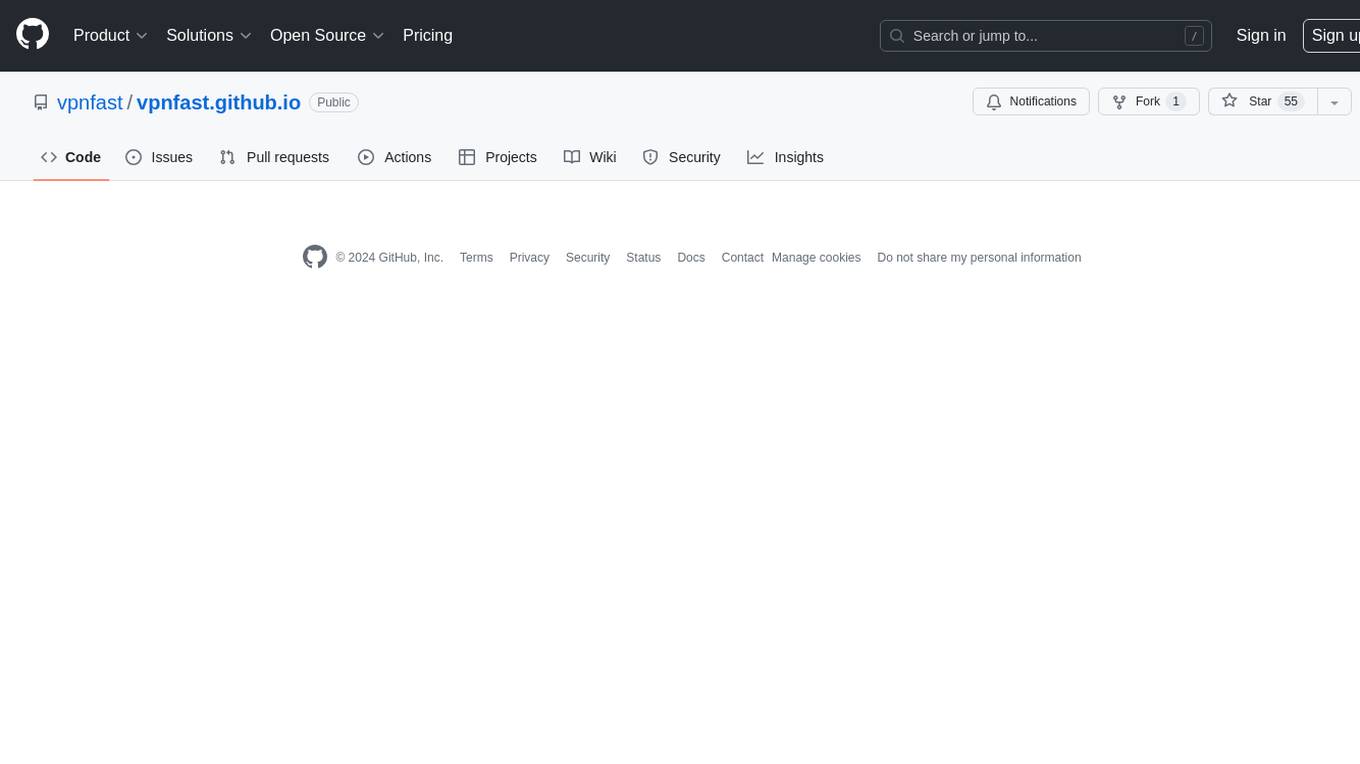
vpnfast.github.io
VPNFast is a lightweight and fast VPN service provider that offers secure and private internet access. With VPNFast, users can protect their online privacy, bypass geo-restrictions, and secure their internet connection from hackers and snoopers. The service provides high-speed servers in multiple locations worldwide, ensuring a reliable and seamless VPN experience for users. VPNFast is easy to use, with a user-friendly interface and simple setup process. Whether you're browsing the web, streaming content, or accessing sensitive information, VPNFast helps you stay safe and anonymous online.
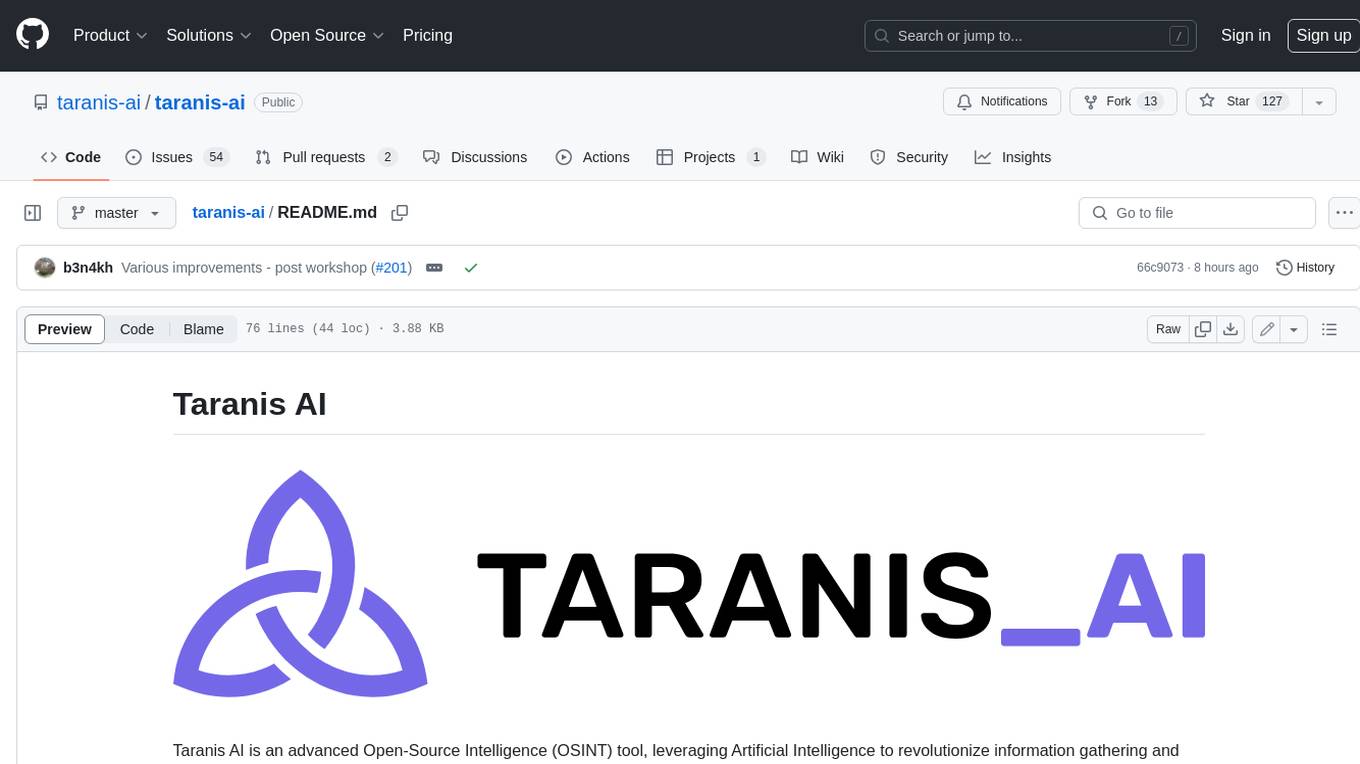
taranis-ai
Taranis AI is an advanced Open-Source Intelligence (OSINT) tool that leverages Artificial Intelligence to revolutionize information gathering and situational analysis. It navigates through diverse data sources like websites to collect unstructured news articles, utilizing Natural Language Processing and Artificial Intelligence to enhance content quality. Analysts then refine these AI-augmented articles into structured reports that serve as the foundation for deliverables such as PDF files, which are ultimately published.
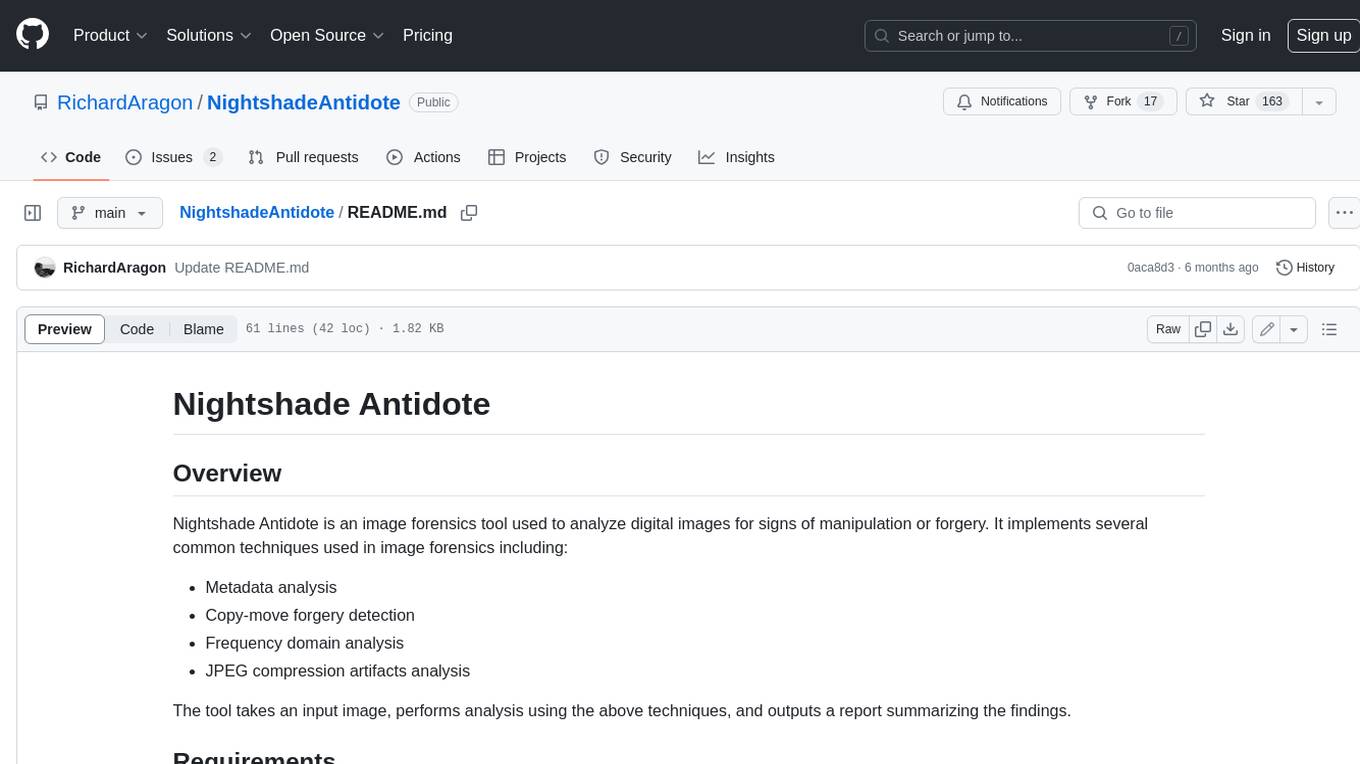
NightshadeAntidote
Nightshade Antidote is an image forensics tool used to analyze digital images for signs of manipulation or forgery. It implements several common techniques used in image forensics including metadata analysis, copy-move forgery detection, frequency domain analysis, and JPEG compression artifacts analysis. The tool takes an input image, performs analysis using the above techniques, and outputs a report summarizing the findings.
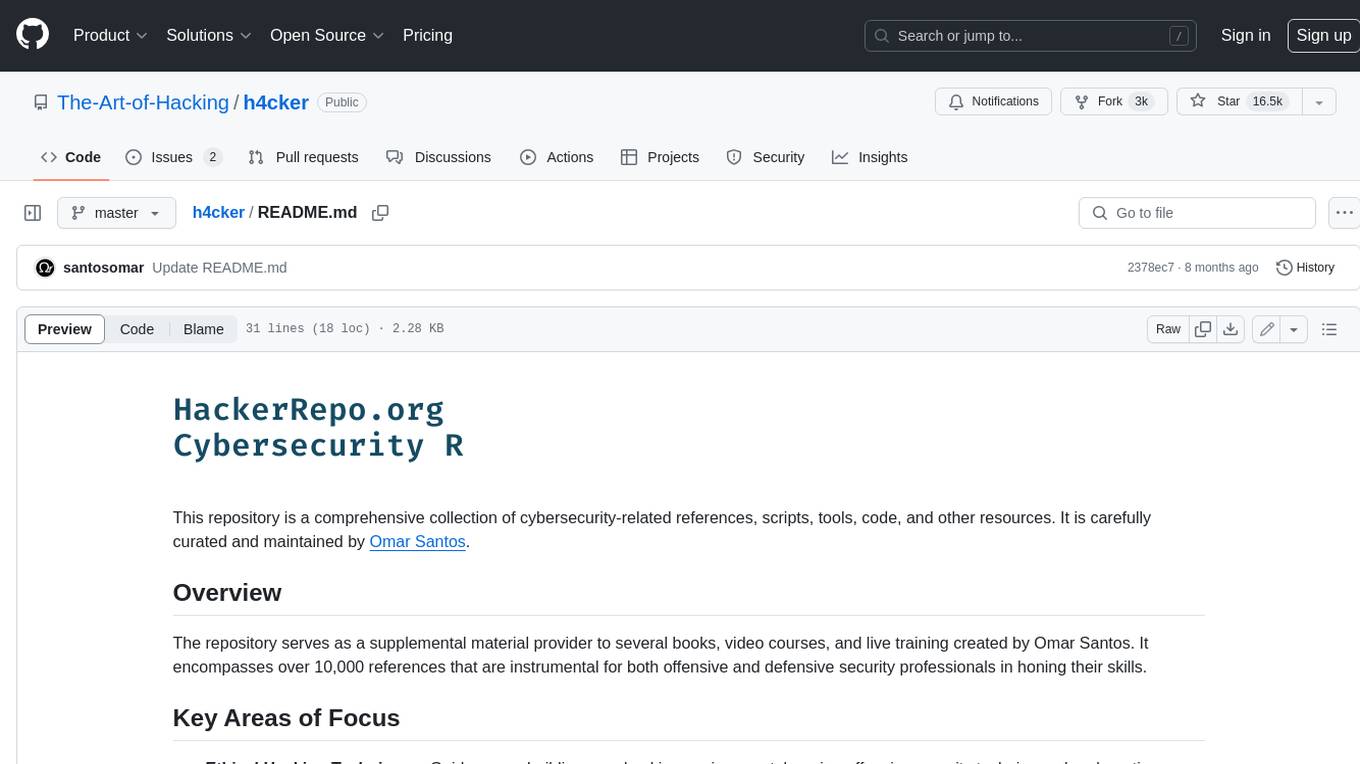
h4cker
This repository is a comprehensive collection of cybersecurity-related references, scripts, tools, code, and other resources. It is carefully curated and maintained by Omar Santos. The repository serves as a supplemental material provider to several books, video courses, and live training created by Omar Santos. It encompasses over 10,000 references that are instrumental for both offensive and defensive security professionals in honing their skills.
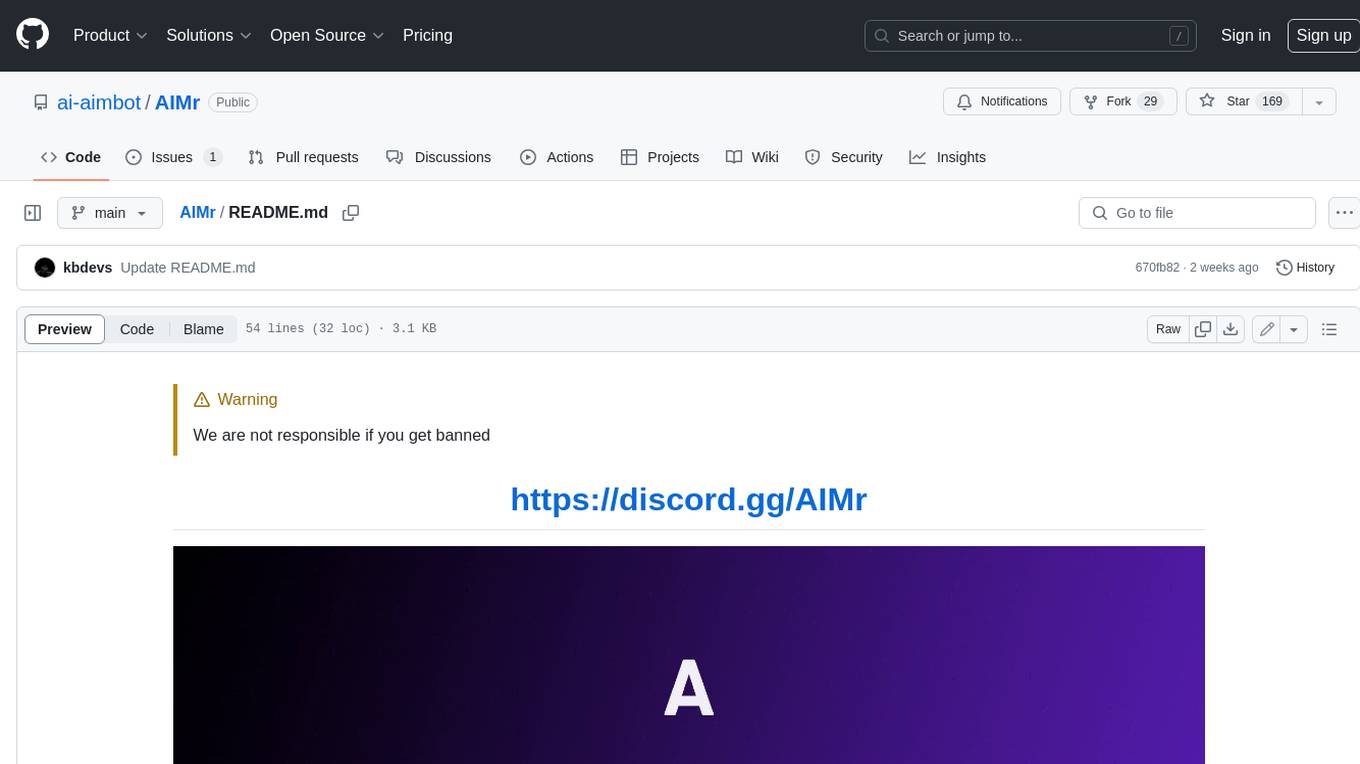
AIMr
AIMr is an AI aimbot tool written in Python that leverages modern technologies to achieve an undetected system with a pleasing appearance. It works on any game that uses human-shaped models. To optimize its performance, users should build OpenCV with CUDA. For Valorant, additional perks in the Discord and an Arduino Leonardo R3 are required.
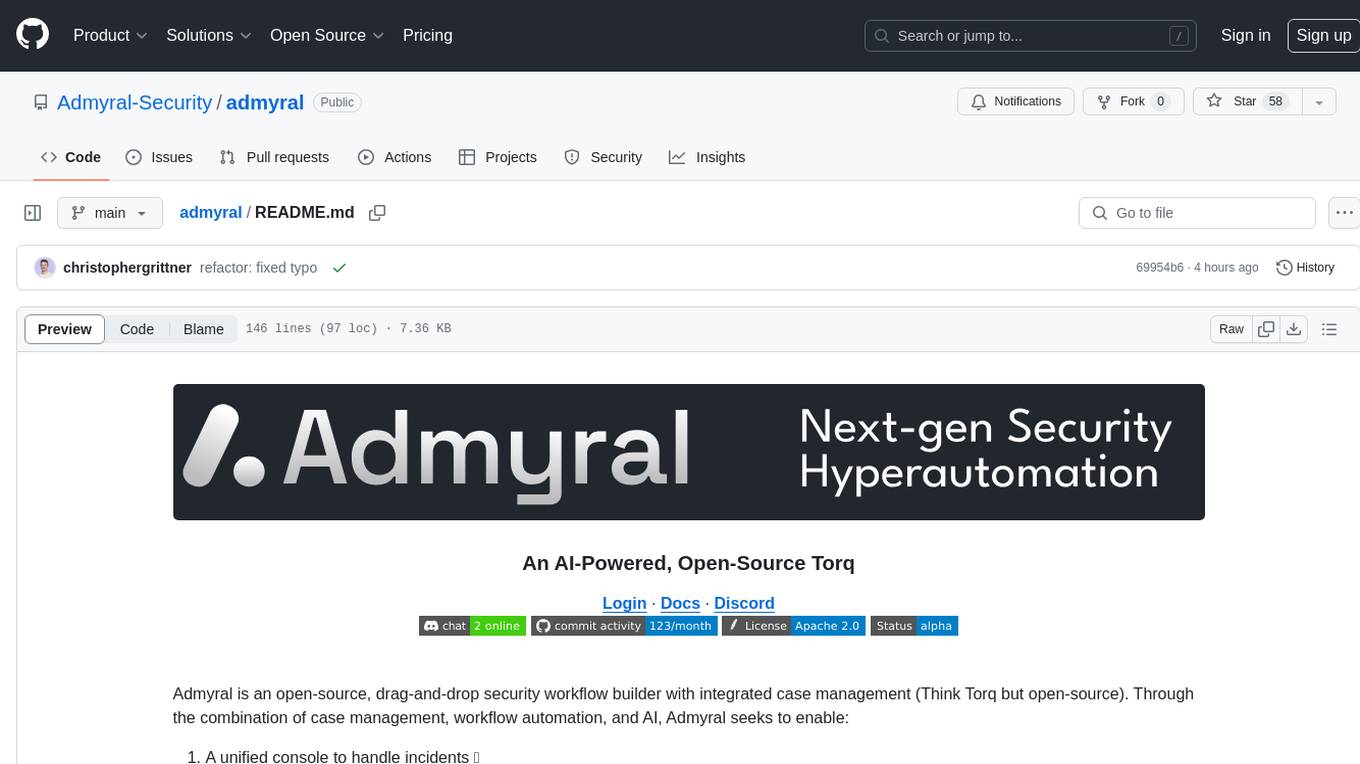
admyral
Admyral is an open-source Cybersecurity Automation & Investigation Assistant that provides a unified console for investigations and incident handling, workflow automation creation, automatic alert investigation, and next step suggestions for analysts. It aims to tackle alert fatigue and automate security workflows effectively by offering features like workflow actions, AI actions, case management, alert handling, and more. Admyral combines security automation and case management to streamline incident response processes and improve overall security posture. The tool is open-source, transparent, and community-driven, allowing users to self-host, contribute, and collaborate on integrations and features.



















